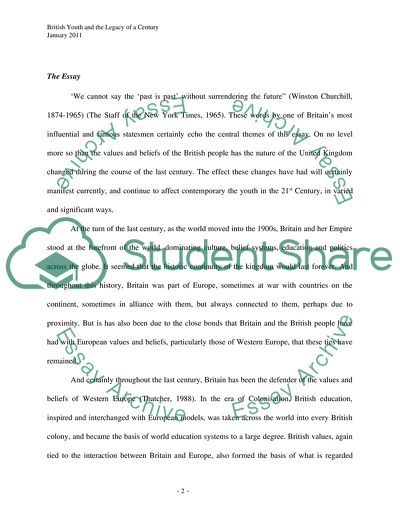Cite this document
(British Youth in the 21st Century - Changes in Values and Beliefs and Essay - 1, n.d.)
British Youth in the 21st Century - Changes in Values and Beliefs and Essay - 1. https://studentshare.org/social-science/1747930-based-on-your-research-and-experience-critically-assess-how-values-and-beliefs-have-changed-in-britain-over-the-last-century-analyse-how-these-changes-affect-britains-youth-in-the-21st-century-8195
British Youth in the 21st Century - Changes in Values and Beliefs and Essay - 1. https://studentshare.org/social-science/1747930-based-on-your-research-and-experience-critically-assess-how-values-and-beliefs-have-changed-in-britain-over-the-last-century-analyse-how-these-changes-affect-britains-youth-in-the-21st-century-8195
(British Youth in the 21st Century - Changes in Values and Beliefs and Essay - 1)
British Youth in the 21st Century - Changes in Values and Beliefs and Essay - 1. https://studentshare.org/social-science/1747930-based-on-your-research-and-experience-critically-assess-how-values-and-beliefs-have-changed-in-britain-over-the-last-century-analyse-how-these-changes-affect-britains-youth-in-the-21st-century-8195.
British Youth in the 21st Century - Changes in Values and Beliefs and Essay - 1. https://studentshare.org/social-science/1747930-based-on-your-research-and-experience-critically-assess-how-values-and-beliefs-have-changed-in-britain-over-the-last-century-analyse-how-these-changes-affect-britains-youth-in-the-21st-century-8195.
“British Youth in the 21st Century - Changes in Values and Beliefs and Essay - 1”. https://studentshare.org/social-science/1747930-based-on-your-research-and-experience-critically-assess-how-values-and-beliefs-have-changed-in-britain-over-the-last-century-analyse-how-these-changes-affect-britains-youth-in-the-21st-century-8195.


